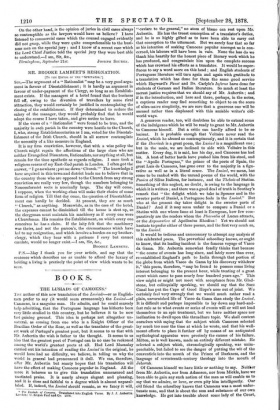MR. BROOKE LAMBERT'S RESIGNATION.
[TO THE EDITOR OF THE "SesersroR.1 SIR,—The argument of a " Rationalist "may be a very good argu- ment in favour of Diaestablishment ; it is hardly an argument in favour of under-payment of the Clergy, so long as an Establish- ment exists. If the managers of a hotel found that the business fell off, owing to the diversion of travellers by some rival attraction, they would certainly be justified in contemplating the closing of the establishment. If they determined to reduce the salary of the manager, they would probably find that he would adopt the course I have taken, and give notice to leave.
If the views of a " Rationalist " were found to be true, and the majority in each parish in the country were hostile to the Church, I, who, strong Establishmentarian as I am, voted for the Disestab- lishment of the Irish Church, should in all sorrow contemplate the necessity of a like measure in England.
It is my firm conviction, however, that with a wise policy the Church might regain the affections of the large class who are neither Evangelical Dissenters, Rationalists, nor anything at all, but remain for the time apathetic as regards religion. I once took a religious census of my East-End parish in London. I often got the answer, "I go nowhere ; put me down ' Church.' " The knowledge I have acquired in this town and district leads me to believe that in the country those who are opposed to the Church from any strong conviction are really very few, though the numbers belonging to Nonconformist sects is nominally large. The day will come, I suppose, when the working-class will make their choice of some form of religion. Till that day come, the question of Disestablish- ment can hardly be decided. At present, they are as much "Church," as anything. Meanwhile, as in the case of the hotel, the expenses cannot be diminished till the house is shut up, so the clergyman must maintain his machinery as if every one were a Churchman. His remains the Establishment, on which every one conceives he has a claim. If the laity felt that the machinery was theirs, and not the parson's, the circumstances which have led to my resignation, and which involve a burden on my brother- clergy, which they bear with a patience I envy but cannot emulate, would no longer exist.—I am, Sir, &c.,
BROOKE LAMBERT.
P.S.—May I thank you for your article, and say that the sentence which describes me as unable to afford the luxury of holding a living is precisely the point of view which wants to be seen.






























 Previous page
Previous page